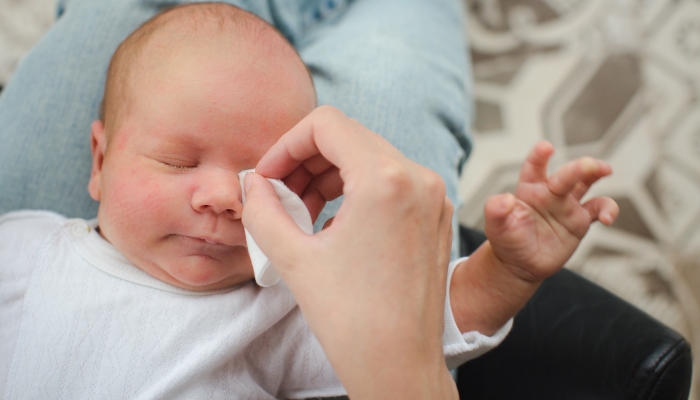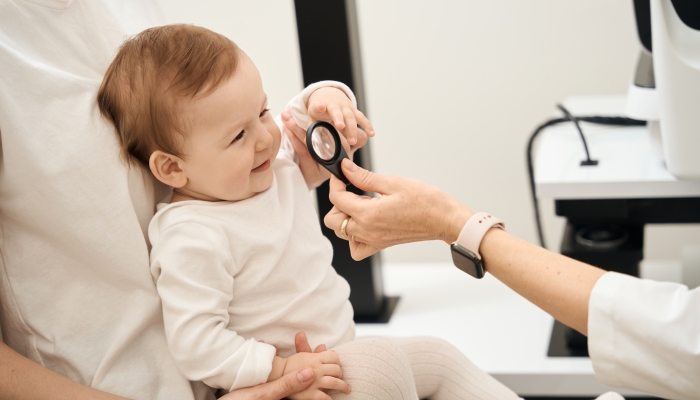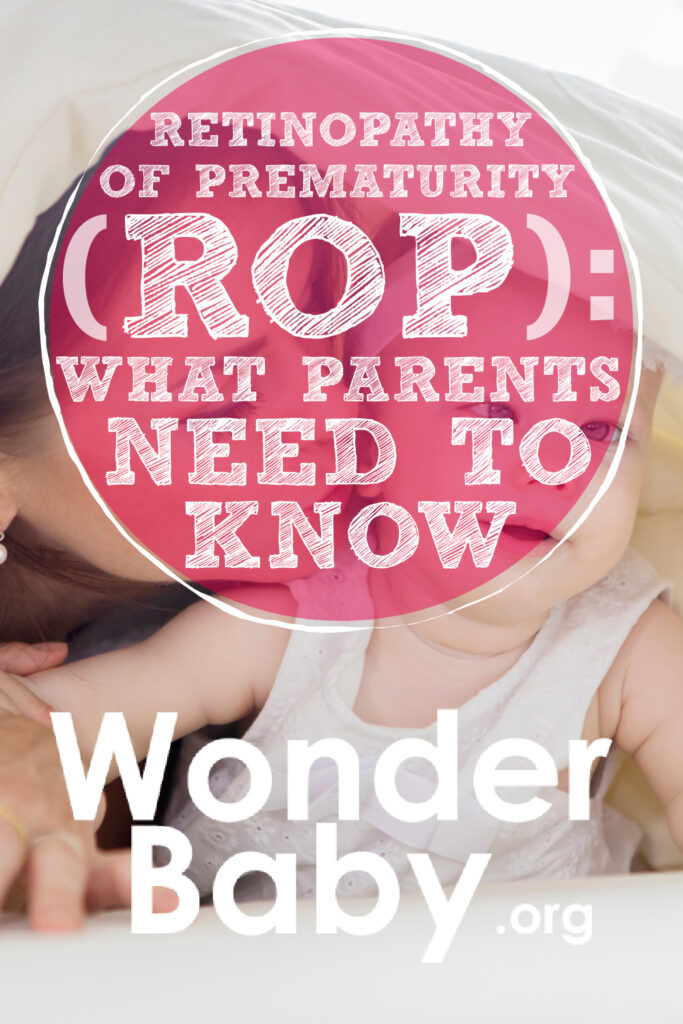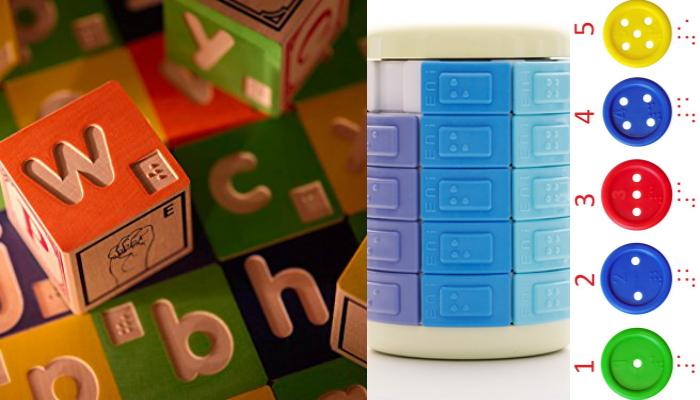Retinopathy of Prematurity (ROP): What Parents Need to Know

- Retinopathy of prematurity is a problem with blood vessel formation in the eye.
- Prematurity, high amounts of oxygen delivery, and blood transfusions can increase the risk of ROP.
- Signs of ROP include white pupils, crossed eyes, and severe nearsightedness.
- Parents should ensure their premature babies receive frequent eye exams and early intervention when necessary.
If you are like most parents, you probably felt that pregnancy was both exciting and stressful. You may have used an app to compare your baby’s size to different fruits or household items, read books about child development, and created a birth plan. There is so much to learn about how to care for a new baby.
If your baby is born early, it can add even more things for you to worry about.
Premature infants are at a high risk of developing retinopathy of prematurity, along with a few other issues. Fortunately, healthcare has come a long way, and premature infants have an excellent chance of developing into completely healthy children.
Retinopathy of Prematurity (ROP): The Basics

Experts at the Cleveland Clinic11. Cleveland Clinic Medical Professional. Retinopathy Of Prematurity. Cleveland Clinic. 2023. https://my.clevelandclinic.org/health/diseases/17430-retinopathy-of-prematurity show that 14,000 to 16,000 infants develop retinopathy of prematurity every year. Even though it is relatively common, many people don’t know much about this condition.
Definition
Retinopathy of prematurity happens when the retinal blood vessels do not develop completely or correctly. Blood vessels in the eyes are one of the last things to develop and mature while a baby is in utero. Blood vessels can continue to grow and develop after your baby is born, but they might not develop normally.
Stages of ROP
There are 5 different stages of retinopathy of prematurity — these range from mild to extremely severe.
- Stage 1: Mildly abnormal blood vessel growth. Stage 1 ROP typically resolves without any special treatment.
- Stage 2: Moderately abnormal blood vessel growth. Like stage 1 ROP, stage 2 ROP typically goes away on its own, although it may take longer to resolve than stage 1.
- Stage 3: Severely abnormal blood vessel growth. This is still considered moderate but may lead to retinal detachment without intervention and treatment.
- Stage 4: Partial retinal detachment. Retinal detachment needs to be treated immediately to avoid complete detachment and vision loss.
- Stage 5: Complete retinal detachment. This is the most severe stage of ROP and may result in blindness or vision loss, even with prompt treatment.
While looking over the stages of retinopathy can be scary and overwhelming, it is important to keep in mind that about 90% of cases of retinopathy11. Cleveland Clinic Medical Professional. Retinopathy Of Prematurity. Cleveland Clinic. 2023. https://my.clevelandclinic.org/health/diseases/17430-retinopathy-of-prematurity of prematurity are mild and resolve without treatment.
Risk Factors
The most common cause of retinopathy of prematurity is being born before 31 weeks gestation. Unfortunately, many treatments used to save premature infants, such as oxygen therapy or blood transfusions, can worsen the development of abnormal blood vessels.
- Prematurity (based on gestational age)
- Amount and duration of oxygen therapy
- Low birth weight
- Blood transfusions
- Anemia
How to Tell if a Baby Has ROP

If you have a premature infant, a baby who needs oxygen therapy, or an infant who needs frequent blood transfusions, you and your child’s doctor should watch closely for signs of retinopathy of prematurity.
Signs to Watch For
Unfortunately, retinopathy of prematurity is hard to identify until there has been severe vision loss or retinal detachment. Infants, even those without abnormal blood vessels, have poor vision when they are young. The best way to determine whether your baby is developing retinopathy of prematurity is to allow your pediatrician to perform frequent eye exams.
As your child ages, you can watch for the following signs:
- White or cloudy pupils
- Abnormal eye movements
- Severe nearsightedness
- Crossed eyes
Diagnostic Procedures
Medical experts at Johns Hopkins University22. Richardson, C.. Retinopathy of Prematurity (ROP). Johns Hopkins Medicine. https://www.hopkinsmedicine.org/health/conditions-and-diseases/retinopathy-of-prematurity recommend that all premature infants and those with extremely low birth weight be tested for retinopathy of prematurity between four and six weeks after delivery.
Physicians in the neonatal intensive care unit are specially trained to assess babies for prematurity retinopathy. They will use special eye drops to dilate your baby’s pupils, which allows them to look closely at the retinal vessels and optic nerve.
If your child remains high risk after leaving the hospital, they will need frequent follow-up eye exams with a pediatric ophthalmologist. Follow-up exams may be necessary every 1-3 weeks until your baby’s ophthalmologist determines that your baby needs surgery or the risk of vision loss has passed.
Treatment and Interventions for ROP

Treatments for retinopathy of prematurity depend on the severity of your child’s eye disease. The National Eye Institute33. U.S. Department of Health and Human Services. At a glance: Retinopathy of Prematurity. National Eye Institute. 2022. https://www.nei.nih.gov/learn-about-eye-health/eye-conditions-and-diseases/retinopathy-prematurity reassures parents that most premature babies will eventually develop normal blood vessels without medical treatment. If your baby has severe prematurity retinopathy or vision loss, there are treatments available.
Early Intervention
Babies born prematurely should receive frequent screenings from their pediatric ophthalmology team. The most important thing you can do for your baby is ensure they receive early treatment to prevent vision loss.
In severe cases of ROP, early treatment may prevent complete retinal detachment and blindness.
Treatment Methods
Treatment options for retinopathy of prematurity include:
- Laser Therapy: Laser treatment burns away peripheral areas of the retina. This treatment uses heat to shrink abnormal blood vessels and is less invasive than eye surgery. A study published in the Journal of International Ophthalmology44. Gunay, M., Celik, G., Ovali, F., Yetik, H., Aktas, A., & Gunay, B. O.. One-year clinical outcome after laser treatment for retinopathy of prematurity at a tertiary center in Turkey. International Ophthalmology. 2014;35(1), 27–35. https://doi.org/10.1007/s10792-014-0014-x showed that laser therapy is effective for treating mild retinopathy of prematurity and can prevent permanent vision loss.
- Cryotherapy: Cryotherapy is similar to laser treatment and is most effective for early stages of retinopathy of prematurity. Research published in the Archives of Ophthalmology55. Multicenter Trial of Cryotherapy for Retinopathy of Prematurity. Archives of Ophthalmology. 1988;106(4), 471. https://doi.org/10.1001/archopht.1988.01060130517027 showed that freezing abnormal blood vessels reduced the risk of permanent vision loss and blindness by as much as 50%.
- Vitrectomy: Inside the eye is a substance called vitreous. Abnormal growth of the blood vessels can cause this gel-like substance to fill with blood, which, in turn, causes vision problems. During a vitrectomy66. Vitrectomy. Johns Hopkins Medicine. 2019. https://www.hopkinsmedicine.org/health/wellness-and-prevention/vitrectomy, a surgeon will remove this substance from the eye and replace it with a synthetic gel.
- Scleral Buckling: If your child has a detached retina, they will need urgent treatment and surgery. Scleral buckling is a treatment that can repair a detached retina, but it needs to be performed right away. This procedure can restore vision, but it is not without risk. Complications may include infection in your baby’s eye, bleeding, future vision problems, and increased pressure in the eye. After surgery, your baby will need frequent eye examinations to prevent complications in the future.
Post-treatment Care
Most babies respond well to treatments for retinopathy. Your baby’s ophthalmologist will recommend a screening schedule based on the severity of your child’s eye problems. Your baby may need special eye drops, glasses, or additional surgeries to take care of retinal scarring.
How to Cope and Find Support for ROP

Parents of premature babies born with retinopathy often worry about their child’s future. Because these children are at higher risk for vision problems and other developmental disorders, early intervention is essential.
For the Child
Children with retinopathy of prematurity need timely treatment, frequent screening examination appointments, and possible early intervention services. In addition, you can help your child as they get older by enrolling them in peer support groups, finding toys for visually impaired children, and helping them find activities they enjoy.
Early intervention services are often available through local health and human services 77. Birth to Three Program. Illinois Department of Human Services. https://www.dhs.state.il.us/page.aspx?item=87748departments. They can help your child learn to function independently, solve academic problems, and interact with their peers.
In addition, administrators and teachers at your child’s school can help you create an individualized education plan (IEP) for your visually impaired child. An IEP helps set reasonable goals and standards for your child and allows teachers and counselors to understand your child’s unique needs and goals.
For the Parents
Health problems in children can be hard on the entire family. As a parent of a special needs or vision-impaired child, it is crucial that you take time to care for yourself. Support groups like parents helping parents88. Find a Support Group. Parents Helping Parents. https://www.parentshelpingparents.org/schedule provide ways for parents to share their feelings and connect with each other.
Even joining Facebook groups or organizations that have nothing to do with parenting can be helpful for parents. Finding a group of friends for venting, getting advice, and relaxing is an important part of self-care. While it sounds cliche, you really cannot take care of your child if you do not first care for yourself.
FAQs
What are the long-term effects of ROP on a child’s vision?
In about 90% of cases, ROP resolves on its own and does not leave lasting effects. Unfortunately, ROP does still cause blindness in 400-600 babies each year. The long-term impact of ROP can vary from extremely mild to total retinal detachment and blindness.
Babies born at an earlier gestational age and with lower birth weight are more likely to suffer long-term vision problems caused by ROP.
Are there specific ROP symptoms that might begin as my child grows older?
In very young infants, retinopathy of prematurity can only be seen by a neonatologist or pediatric ophthalmologist using special equipment. That is why it is so important for premature babies to have frequent eye exams.
As a child with ROP gets older, the signs become more obvious. Children with ROP may have a lazy eye, extreme near-sightedness, white or cloudy pupils, and abnormal eye movements.
Can environmental factors after birth, such as exposure to screens, exacerbate ROP conditions?
The American Optometric Association99. Computer vision syndrome. AOA.org. https://www.aoa.org/healthy-eyes/eye-and-vision-conditions/computer-vision-syndrome?sso=y warns that staring at screens all day can cause a condition called computer vision syndrome. People who use computers, phones, tablets, and e-readers for hours at a time are at risk of eye strain. Vision problems like ROP can make computer vision syndrome worse.
Ensuring that your child uses their corrective devices, such as glasses, while they are looking at screens and limiting screen time can help decrease eye strain.
Are there any supplements my child can take to keep their eyes healthy?
Vitamin A and fish oil supplements can help keep the eyes healthy and reduce the risk of worsening vision as your child ages. While these nutrients help keep the eyes healthy, they will not restore lost vision.
Be sure to speak to your child’s pediatrician before adding supplements to your child’s diet. Too much vitamin A may cause nausea and vomiting, and too much fish oil can strain the liver.
References
- Cleveland Clinic Medical Professional. (2023, August 30). Retinopathy Of Prematurity. Cleveland Clinic. https://my.clevelandclinic.org/health/diseases/17430-retinopathy-of-prematurity
- Richardson, C. (n.d.). Retinopathy of Prematurity (ROP). Johns Hopkins Medicine. https://www.hopkinsmedicine.org/health/conditions-and-diseases/retinopathy-of-prematurity
- U.S. Department of Health and Human Services. (2022, June 24). At a glance: Retinopathy of Prematurity. National Eye Institute. https://www.nei.nih.gov/learn-about-eye-health/eye-conditions-and-diseases/retinopathy-prematurity
- Gunay, M., Celik, G., Ovali, F., Yetik, H., Aktas, A., & Gunay, B. O. (2014). One-year clinical outcome after laser treatment for retinopathy of prematurity at a tertiary center in Turkey. International Ophthalmology, 35(1), 27–35. https://doi.org/10.1007/s10792-014-0014-x
- Multicenter Trial of Cryotherapy for Retinopathy of Prematurity. (1988). Archives of Ophthalmology, 106(4), 471. https://doi.org/10.1001/archopht.1988.01060130517027
- Vitrectomy. Johns Hopkins Medicine. (2019, December 26). https://www.hopkinsmedicine.org/health/wellness-and-prevention/vitrectomy
- Birth to Three Program. Illinois Department of Human Services. (n.d.). https://www.dhs.state.il.us/page.aspx?item=87748
- Find a Support Group. Parents Helping Parents. (n.d.). https://www.parentshelpingparents.org/schedule
- Computer vision syndrome. AOA.org. (n.d.). https://www.aoa.org/healthy-eyes/eye-and-vision-conditions/computer-vision-syndrome?sso=y

The information WonderBaby provides is not intended to be, and does not constitute, medical or other health advice or diagnosis and should not be used as such. Always consult with a qualified medical professional about your specific circumstances.
Related Posts

Eye Conditions and Syndromes, Visual Impairment
Neuralink Announces Plans to Restore Sight to the Blind with Brain Chip
Elon Musk’s company Neuralink has announced plans to begin human trials of its new “Blindsight” brain chip by the end of 2025.

Visual Impairment
The Gift of Understanding: How a Young Child Helps His Blind Father Navigate Life
When a parent is blind, it’s natural for people to wonder how their sighted child will adapt. Will they struggle to understand their parent’s needs? Will they feel burdened by...

Braille and Literacy, Toys, Visual Impairment
24 Braille Toys for Kids Who are Blind
Everything from alphabet blocks to raised line coloring pages and activity books to puzzles to card and board games... and so much more! And it's all in braille ready for...